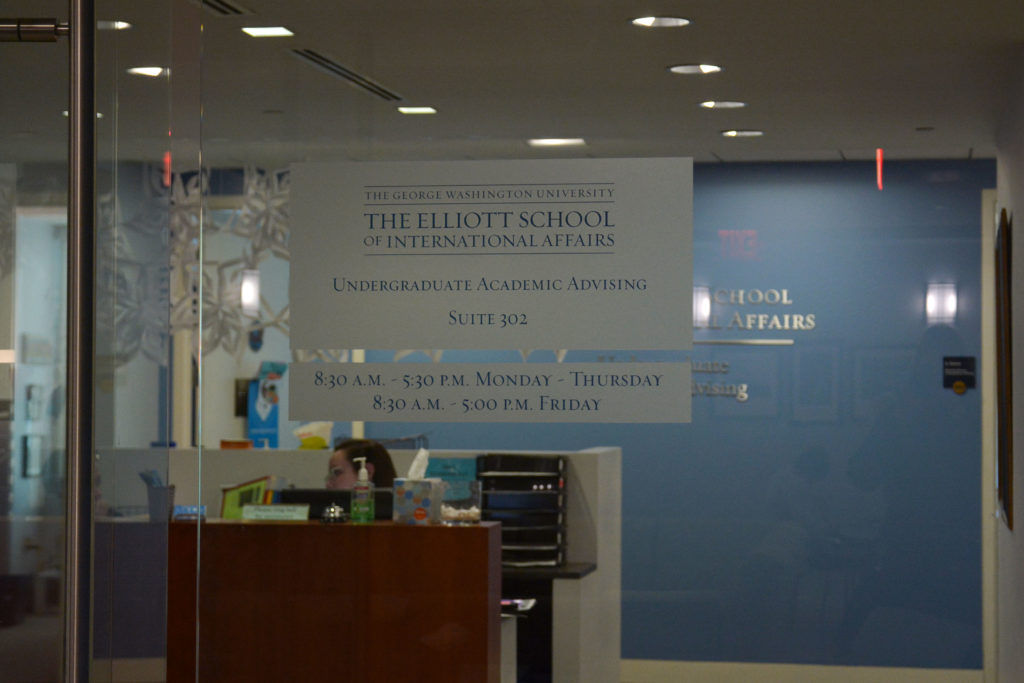Students who visit the advising office in the international affairs school will now face penalties if they don’t show up to scheduled appointments.
The Undergraduate Academic Advising office in the Elliott School of International Affairs sent an email to students last week outlining a new “no-show” policy preventing students from signing up for 30-minute advising sessions if they miss two or more appointments in a semester. Officials said there has been a “high demand” for advisers, and the policy change will give more students opportunities for individualized advising sessions.
“We understand that unexpected academic obligations, work commitments or illness can affect your schedule,” advising officials wrote to the students in an email last week. “But because we have a high demand for appointments, your timely cancellation will allow us to offer your time slot to another student.”
Students will be required to cancel their meeting 24 hours before the appointment, and those with a record of missing or being late to scheduled appointments without canceling will encounter repercussions. Affected students can still use drop-in meeting and office hours to meet with advisers, the email states.
University spokesman Jason Shevrin said the Elliott School advising office began tracking missed advising appointments last year and found “hundreds” of no-shows.
“In consideration of the time advisers spend preparing for student meetings, as well as the meeting time itself, no-show appointments lead to hundreds of hours of lost productivity for advisers and lost opportunity for students who were unable to schedule an appointment,” Shevrin said.
He added that other schools within the University have “no-show” policies, which the Elliott School referenced when creating its policy.
Shevrin declined to say how many students made advising appointments in the Elliott School last semester.
All advisers in the Elliott School advising office did not return multiple requests for comment.
Students in the Elliott School who have used the school’s advising services said there should be consequences for missing advising appointments without canceling ahead of time to prevent students from wasting advisers’ time.
Aaron Datta, a freshman majoring in international affairs and economics, said the new policy “makes sense” because Elliott School advisers, who are assigned to specific students, must meet with large numbers of students each semester and cannot afford to lose time that could be allocated toward helping other students.
He said the penalties for two missed appointments are reasonable because students would still be permitted to use drop-in sessions or office hours to speak with their adviser.
“I think it’s good that even if you’ve got two no-shows, it’s only until the end of the semester, and it’s not like you no longer have access to an academic adviser at all,” Datta said.
Veronica Tis, a freshman majoring in international affairs, said the “no-show” policy seems fair because it encourages students to avoid being late to their appointments.
“You don’t want to keep the person who you’re supposed to have an appointment with waiting, and I think if there’s not a consequence for it, there’s no reason to come on time,” Tis said.
Tis added that some students living on the Mount Vernon Campus might have more difficulty reaching appointments in Foggy Bottom on time because of unpredictable changes in the time of their commute.
Alice Chang, a freshman international affairs major, said the “no-show” policy leaves little leeway for students whose busy schedules can make it difficult to reach meetings on time, but she also is sympathetic to advisers who lose time because of missed appointments.
“I personally don’t know that many students who take advising so seriously that they would be greatly affected by this new policy, but it’s understandable and beneficial to both students and advisers,” Chang said.





